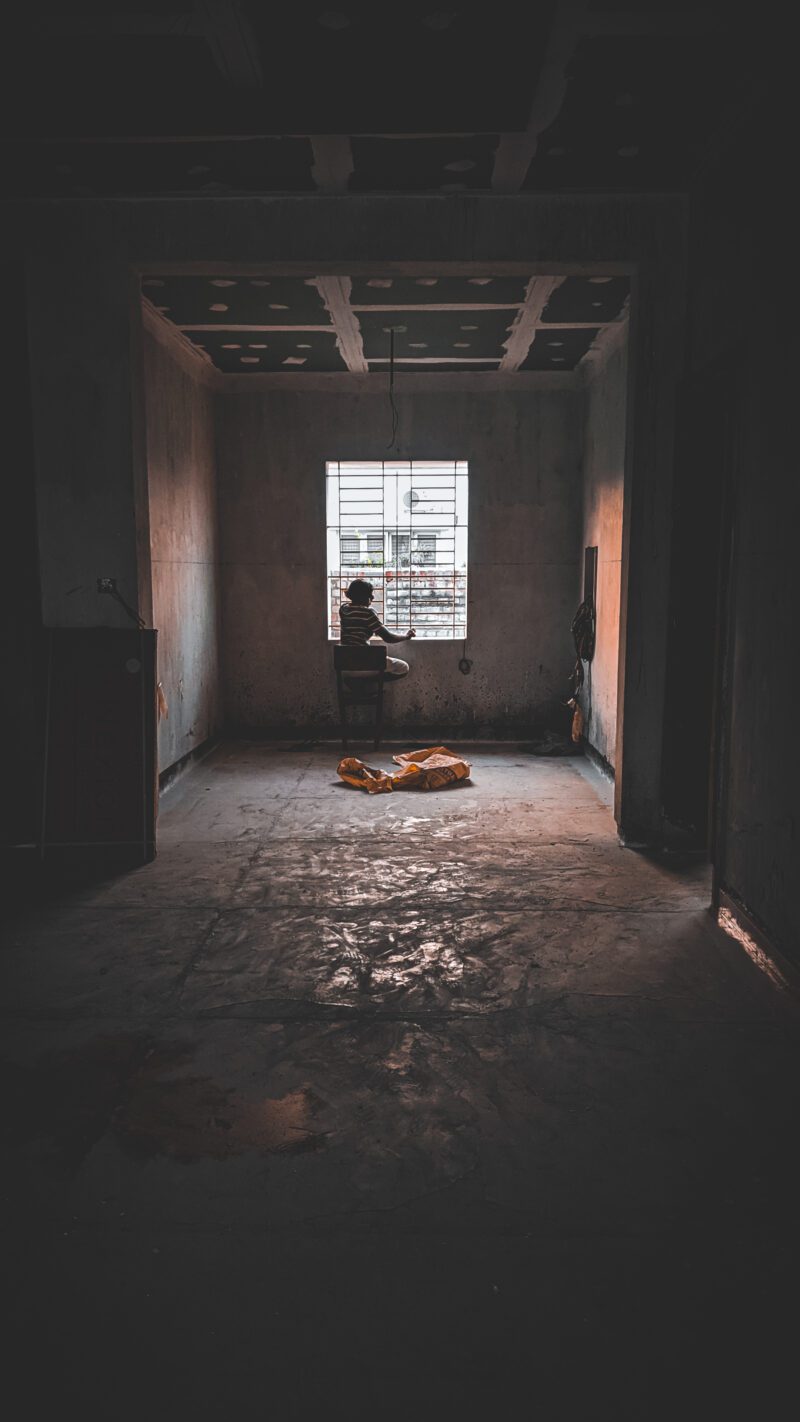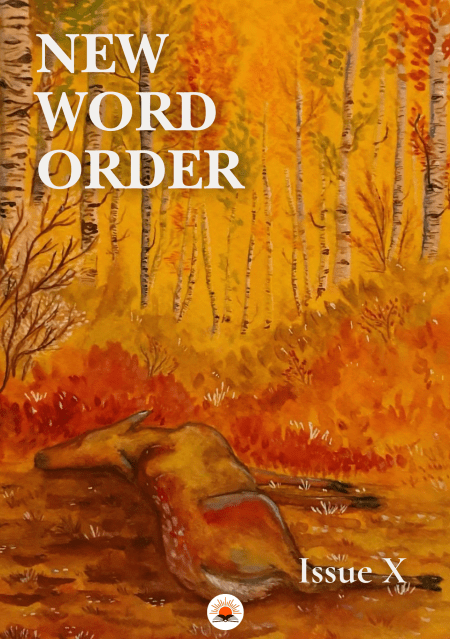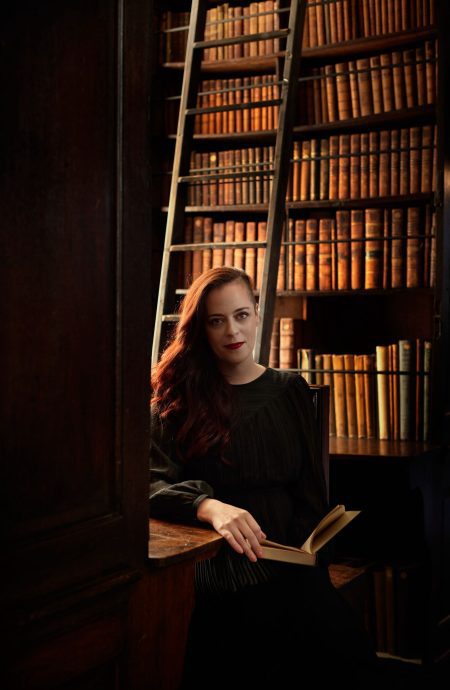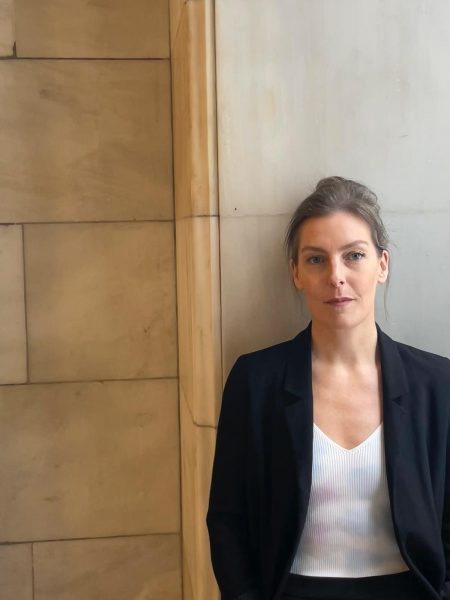By Cillian Barrett
Photography by Kavinraj Ragavendra Subramaniam. His full profile is available in the Art & Photography section.
I’ve been slow-dancing with my shadow for a few days now.
I have a lamp and an old leather armchair cat-clawed along its side (its springs are busted but it still reclines if you yank it). I have a bare dead bulb dangling from the ceiling, a small old record player, two Bill Evans records, the Blade Runner soundtrack, and a badly scratched copy of Bob Dylan’s Desire.
I have a soft yellow blanket that smells like wet soil and a perfume called Scandal. I have whatever shadows I can make for myself.
The dead bulb has a shadow.
It’s raining outside – when it rains in Paris, the world turns blue. It rains vertically here, straight down, never in from the side.
I’m listening to Waltz for Debbie because the sound of rain patters nicely with Bill Evans.
Jazz is ideal music for cold nights.
Suzanne would bring records. She had some Leonard Cohen. She had some Velvet Underground. She had Dylan live at the Royal Albert Hall back in 1966. Some serious songs on that one. It was an original, too.
LP1 Side A: Visions of Johanna and It’s All Over Now, Baby Blue (plus two I don’t remember).
LP1 Side B: Desolation Row, Just Like A Woman, and Mr. Tambourine Man. LP2 Side C: Leopard-Skin Pillbox Hat (plus four I never cared for).
LP2 Side D (my favourite): One Too Many Mornings, Ballad of a Thin Man and Like A Rolling Stone.
All this on one record.
We’d listen to it straight through, both sides of both discs.
If she brought rum, we’d sip it slowly and shout adjectives and nouns. It was a game we played: she’d yell an adjective and then I’d have to match it with a noun.
She called it “Spontaneous Composition,” said it was the only honest way to write poetry.
She had a lot of ideas.
If she brought rum, then – after some spontaneous composition – we’d listen to other records and talk. There was no specific topic, but we often ended up comparing childhoods. I never deciphered how truthful she was.
She told me she used to collect dead flies in a plastic chewing gum container. She told me there was a guest bedroom upstairs in her childhood home, with one window. The room was always humid and musty, the whole house’s heat rising up – flies would be drawn there and get stuck. She liked to watch the flies at the window. She said there was a point when they gave up, and you could see it. They’d just suddenly stop buzzing – drop – as if they’d had a heart attack, and that was it.
She’d scoop their corpse into her container with an old bible that sat on the bedside table.
We’d listen to So Long Marianne, because that was my favourite Cohen song. “No. Yes. Is a good one,” she’d say.
Her favourite Cohen song was Suzanne, because she’d supposedly been named after it. She preferred the Francois Hardy version in French.
We met outside a café.
She was standing at the corner, with a clipboard, raising money for an endangered species charity.
She was wearing a black woollen long-coat, black shoes, and she had black, curly hair wound in tight spirals.
I hadn’t spoken to anyone in about five days.
I had only enough French to explain I don’t speak it, but she had some English. We talked for two hours.
We talked about old records. We both liked them. I didn’t have many records – I didn’t have much of anything – because I had no money. She said she’d inherited a small collection from her grandfather. Whatever desperation she saw in my eyes or heard in my voice convinced her that I could be trusted. She told me her charity was a scam.
She said she didn’t feel bad leeching money off trust-fund-babies, upper-class dandies, and other nice bourgeoisie. She said they’d only waste it on coffee. She didn’t drink coffee and neither did I.
She wasn’t Marxist or anything – in fact, she had a compulsive distrust for people who didn’t value money.
The next day I returned to the same spot, sat outside the café and watched her. It rained lightly.
The smoke from her cigarette looked ethereal in blue Paris rain.
She roped a small, round woman with a bob-cut into donating fifteen euros a month to her personal fund.
She was smooth, a natural-born-bullshitter. She was raising money for endangered fish, being over-farmed off the coast of Brittany. The golden-lion trout, the tall-horned salmon. Majestic creatures she talked into existence.
She had a lexicographic knowledge of PR jingo, crafting mission statements and ethical guarantees on the fly.
She walked over, had me write down my address, and then she disappeared. Two weeks later she showed up, and since I had nothing better to do, I let her in.
If she brought rum with her, then – after we talked – we’d listen to the 1966 Dylan track, again, but this time we’d dance.
She taught me how to dance.
She scolded me if I tried to maintain a rhythm, or any pattern.
Her dance was chaos; flailing limbs, jumping frantically to a vague tempo of the music.
I didn’t know dancing could be such a release.
There were no thoughts or confusion when you danced like that.
Suzanne danced with her eyes closed and kissed with them open.
She didn’t like to kiss with tongue.
Her mouth tasted like the reflection of a red-traffic-light on the wet road at 3 AM, like a smoked cigarette, like ash and sweet rum.
By the end of LP2 Side C, we were usually on the leather recliner, kissing with eyes open.
I started keeping mine open out of curiosity.
I studied the intricacy of colour.
From a distance her eyes were a cyan-green but up close they became more complex. Around the rim of her iris, the colour was so blue it was black – her pupils, too, shared this sheened darkness and inside, between iris and pupil: teal-blue and cold Atlantic tones, with cracks like crocodile hide through which streaked a jaundice-yellow – it was no longer a flat circle, but a dome; liquid-film on the cornea caught the lamp-light and cast squiggly spider-limbed shadows in the depth – the consistency of shallow water under sun, the way the colour and light shimmered in the near distance – light slanting off the surface, the image of my eyes miniaturised and held in suspension like a fly in amber.
When we kissed, and the warm breath from her nostrils trickled down into my mouth, I would admire the impossibility of it.
These tiny organs can allow all this light to have meaning.
I thought that if humans had never evolved eyes, we wouldn’t even know that light existed.
I thought of how much I didn’t know existed yet, how much more I could see by keeping my eyes open.
I thought about how natural her existence was, how each deviation seemed perfect and unquestionable, the small inlet between her bottom lip and chin, how slight her wrist and the tips of her fingers, and I would think grateful thoughts about perfection, and her kindness in sharing it with me.
Then I would see something new each time, something beautiful and sublime, and all sense and knowledge was washed away, in one overwhelming sensation. I would get a glimpse into the centre of the universe and know I understood the majesty of eyes and all of it.
These thoughts seemed silly in daylight, but in the moment, they were undeniable. After, on the recliner, beneath the yellow blanket, she’d stroke circles into my chest with her index finger and sing Francois Hardy’s cover of Suzanne quietly into my ribcage.
In this stillness, the scent of Scandal became noticeable: honey accord and blood orange.
She told me she’d swiped the perfume from a Sephora.
Her hair on the side of my chest like thin grass; it reminded me of a drenching hot autumn evening, when I walked through the tilled field behind the house, over to the hill. The grass was two feet tall, but I kicked down a small area.
I took my shirt off and lay down, feeling the sun on my pale flesh. I closed my eyes and rested my arms behind my head. The miniature feet of small insects trickled over my skin and stopped suddenly with a flutter, the long thin blades of grass leaned and tickled me. I’d swat at them , eyes closed, thinking them brave horseflies.
I sat up, quietly, and fifty yards to my right, at the edge of the tilled field, sixteen rabbits (I counted) scouted the field cautiously.
I’d never seen them this close. I decided I wouldn’t tell anyone, I’d keep it for myself, this spontaneous mercy. It would be all mine.
But sometimes, when we talked about our past, I would mention this, and Suzanne would nod sadly and say, “Pretty.”
The last night she came, she brought rum with her.
We played spontaneous composition, making meaningless word-poems, listening to Bob Dylan.
We drank rum.
We talked about our childhoods. She told me that her mother made her throw out the fly collection because it was unhygienic. I told her about the field behind my house, where I saw the rabbits, and once saw a fox in broad daylight, it’s fine-orange fur startling in the sun, its stiff puffy tail almost as long as itself, its black, tender paws, soft and agile on the grass.
She said she could use that as another endangered animal. The long-necked fox of Ireland.
I told her foxes don’t have long necks.
“Is better then,” she laughed.
She asked me what love is.
I hesitated, weighing what she really meant.
“Admiration and obsession,” I said.
She laughed.
She shrugged.
“You come up with this?” she asked.
I shook my head.
“Some dead philosopher,” I said.
We drank rum.
We listened to more Dylan.
She kissed me on the edge of my mouth, and she started crying.
Then she was dancing, we were both dancing and she was still crying, dancing to Like A Rolling Stone, and then I was crying and I didn’t know why but I suspect the rum was involved, and I felt a deep affection for her dark curly hair and her small, neat body, I wanted to scoop her up and run away, hide her from something, or hide her from everyone else, keep her just for me.
At some point, talking broadly about life, she said, “What a mess,” and I – my polite, country upbringing getting the better of me – said, “It’s not all bad.”
She stopped dancing and broke down sobbing.
We didn’t make love that night. She passed out on my lap, arms around my neck, the two of us on the leather recliner under the yellow blanket that smelled like a tilled field in rain.
In the morning, she gave me Bob Dylan’s Desire as a gift. It was badly scratched up, which she apologized for, mumbling something in her Parisian accent about “sentiment”. We kissed goodbye and left our eyes open.
It was about a week later I realised that she wasn’t coming back.
I was stoic.
I told myself I didn’t care and that was that.
I started singing “So Long Suzanne” to the tune of So Long Marianne, but I had to elongate the ‘u’ to make up for the extra syllable in Marianne.
So long Su-uzanne, it’s time that we began, to laugh, and cry, and cry, and laugh about it all again.
There was a quart of rum left in the bottle, so I drained it one rainy night, trying to listen to the track she’d left me. There was one song not scratched beyond audibility: Oh, Sister.
I tried to dance the way she taught me, but the song was so slow and beautiful I found myself quietly swaying, eyes closed; the pattering trickle of rain on the window. A little deeper into the rum, I met the shadows on my walls: my dead lightbulb and myself, drawn large by the lamplight, blurred but solid all the way through. I started talking to my shadow.
He didn’t say anything back.
I finished the rum.
I told him about Suzanne, how her flesh was warm and soft, how I could feel the absence of it now, like its own physical presence, the cold pins and needles along my side. I wrapped myself in the yellow blanket and enjoyed some of the Scandal she’d left on it.
Then I had the greatest idea I’d ever had.
“A dance?” I asked, holding my hand out to the shadow on the wall.
My eyes closed, I started swaying, hands extended before me in the air, as if I were slow-waltzing with a ghost.
“Isn’t this a little gay?” my shadow asked.
“Yes,” I said. “But, brother, who’s got time for worries now?”
He didn’t respond because it was true: such sadness and joy in that song, such melancholy-hope of the strangest kind, and we danced, the two of us, my hands grasping the cool air, Dylan doing his own thing, the swaying rhythm of Oh, Sister, and it was a thing of its own.
It really was a thing.
It was a thing of me and my slow feet tapping out on the floor, the shadow mimicking my movements on the wall; a thing of the intricate colour in Suzanne’s eyes, which kept running through my mind, and Dylan using the last softness in his voice, before it rusted up and turned crow-like, moving that softness through me with the blinding truth of emotion.
– Time is an ocean but it ends at the shore. You may not see me tomorrow –
He sings, and the slow violin takes up his call, carries it on long past the end of the lyrics, long after that final line is repeated – it rolls down through the years and tumbles straight into me in this strange time and place.
And it becomes something beyond me, beyond language – but it is here, dancing in the arms of my shadow: an awareness so fragile it would snap if you looked in its eye.
Cillian Barrett
I am a 22-year-old Creative Writing student from Kildare, primarily interested in short, literary fiction. I have been published in Caveat Lector and was once called a “GENIUS” by the mad Ould-Fella who collects empty Guinness cans from under the bridge.



